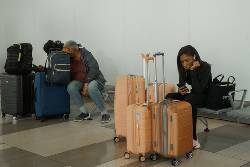U.S. airlines again canceled more than 1,000 flights on Saturday, the second day of the Federal Aviation Administration’s mandate to reduce air traffic because of the government shutdown.
So far, the slowdown at many of the nation’s busiest airports hasn’t caused widespread disruptions. But it has deepened the impact felt by the nation’s longest federal shutdown.
“We all travel. We all have somewhere to be,” said Emmy Holguin, 36, who was flying from Miami Saturday to see family in the Dominican Republic. “I'm hoping that the government can take care of this.”
Analysts warn that the upheaval will intensify and spread far beyond air travel if cancellations keep growing and reach into Thanksgiving week.
Already there are concerns about the squeeze on tourism destinations and holiday shipping.
Here’s what to know about the flight reductions:
How many flights have been canceled?
Flight disruptions ticked up a bit on Saturday — typically a slow travel day — as each of the first two days creeped above 1,000 cancellations, according to FlightAware, a website that tracks flights.
The airport serving Charlotte, North Carolina, was the hardest hit early on Saturday, with 130 arriving and departing flights canceled by mid-afternoon.
Airports in Atlanta, Chicago, Denver, and Newark, New Jersey, also saw numerous disruptions. Ongoing staffing shortages in radar centers and control towers added to the cancellations and delays on Saturday at several East Coast airports, including those around New York City.
Not all the cancellations were due to the FAA order, and those numbers represent just a small portion of the overall flights nationwide. But they are certain to rise in the coming days if the slowdown continues.
The FAA said the reductions impacting all commercial airlines are starting at 4% of flights at 40 targeted airports and will be bumped up again on Tuesday before hitting 10% of flights on Friday.
Transportation Secretary Sean Duffy warned this week that even more flight cuts might be needed if the government shutdown continues and more air traffic controllers are off the job.
Why are the flights being canceled?
Air traffic controllers have gone without paychecks for nearly a month as the shutdown continues, leading many to call in sick and add to already existing staffing shortages.
Most controllers are working mandatory overtime six days a week during the shutdown without pay, and some are taking second jobs to pay their bills, the National Air Traffic Controllers Association has said.
How are passengers being affected?
Most were relieved to find that airlines largely stayed on schedule Friday, and those whose flights were called off were able to quickly rebook. So far, longer international flights haven't been interrupted.
There is still a lot of uncertainty about what flights will be canceled next.
And not everyone has the means to pay for a hotel or deal with a last-minute disruption, said Heather Xu, 46, who was in Miami on Saturday after a cruise and flying home to Puerto Rico.
“Travel is stressful enough. Then you put these disruptions in place and it really makes everything more challenging,” she said.
Rental car companies reported a sharp increase in one-way reservations Friday, and some people are simply canceling flights altogether.
What could be the impacts beyond air travel?
First, there's the potential for higher prices in stores, as nearly half of all U.S. air freight is shipped in the bellies of passenger aircraft.
Major flight disruptions could bring higher shipping costs that get passed on to consumers, said Patrick Penfield, professor of supply chain practice at Syracuse University.
More losses will ripple through the economy if the slowdown continues — from tourism to manufacturing, said Greg Raiff, CEO of Elevate Aviation Group.
“This shutdown is going to impact everything from cargo aircraft to people getting to business meetings to tourists being able to travel," he said. "It’s going to hit the hotel taxes and city taxes. There’s a cascading effect that results from this thing.’’
___
Associated Press journalists Cody Jackson in Miami, Paul Wiseman in Washington, Josh Funk in Omaha, Nebraska, and Matt Sedensky in New York contributed.
...


 Copyright © 1996 - 2025 CoreComm Internet Services, Inc. All Rights Reserved. | View our
Copyright © 1996 - 2025 CoreComm Internet Services, Inc. All Rights Reserved. | View our